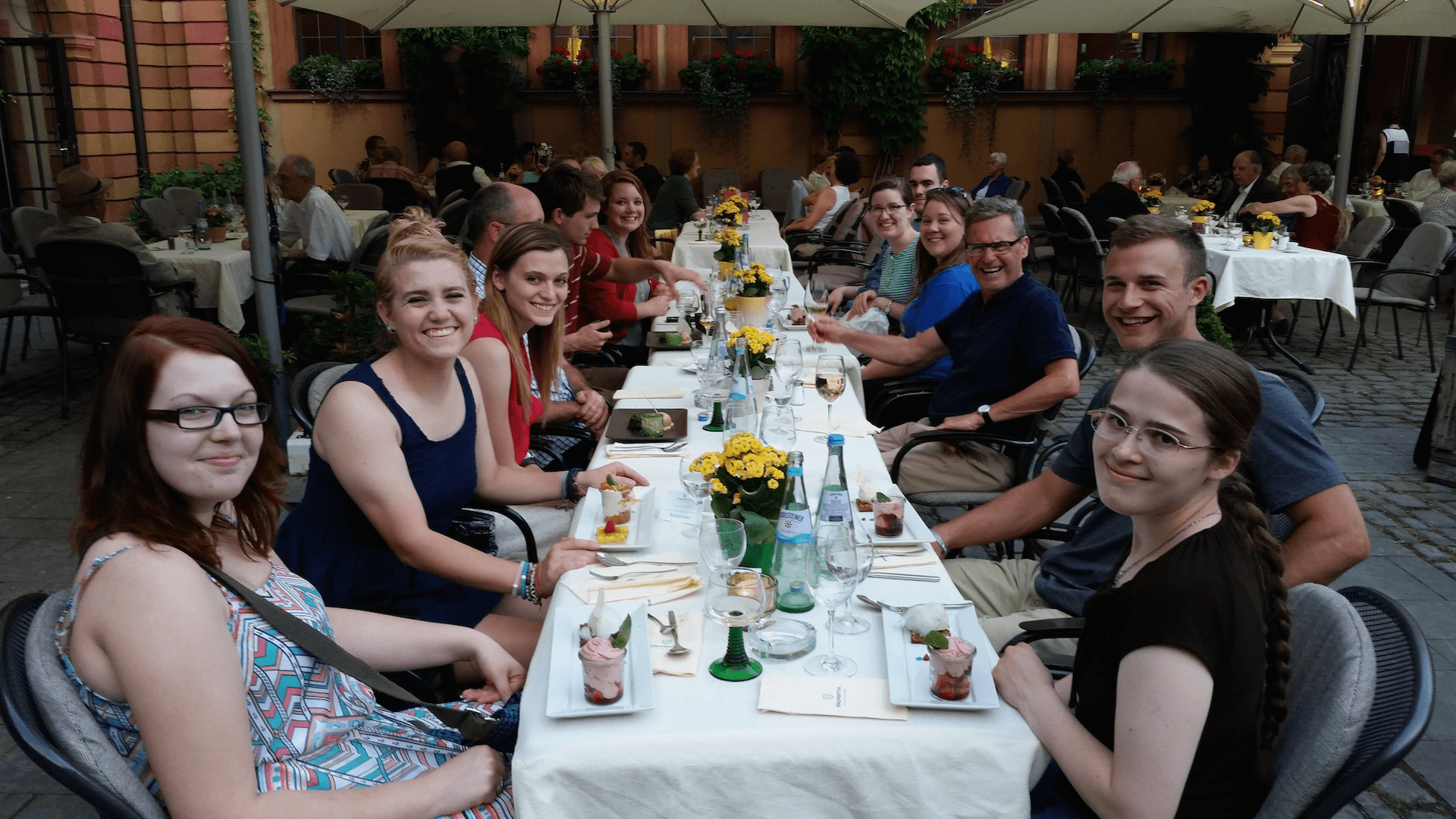
Deutsch Ist Wunderbar: 10 Reasons You Should Study German at Hillsdale College
Written by Finn Cleary
It’s the language of Schiller and Kant, Merkel and Schwarzenegger. Millions speak it, and millions study it. So if you’re considering studying a foreign language at Hillsdale, you should look at German, and here’s ten reasons why.
* * *
- Studying German connects you with a rich literary culture
Germany has been called “das Land der Dichter und Denker“, the land of poets and thinkers, and for good reason. German is the native tongue of many influential writers and thinkers, from Heine to Kafka and Hayek to Kant. Dr. Eberhard Geyer, the head of the German department at Hillsdale, says that “there will be German at good universities even if there are no more German speakers. I’m convinced of that because of the rich literary and cultural heritage.” Students of German at Hillsdale are given exactly that: what Dr. Stephen Naumann calls “an excellent opportunity to delve into the great works of German literature.” - Germans have had a major impact on the United States
With over 45 million ethnic descendants in the United States (that’s about 15% of the total population), German-Americans comprise the largest self-reported ethnic group in the country. German traditions like kindergarten and the Christmas tree continue today, having been introduced to America in the nineteenth century by German immigrants. - The German professors here are some of the best on campus
“I have always been impressed with the German professors,” says third year German student Ben Wallace. “Their passion and enthusiasm as a department rivals any other group of professors or students here on campus.” Ask any German student and they’ll tell you the same: the professors make learning and living the language exciting. - German is a financial language
In an interview with Deutsche Welle, linguist Ulrich Ammon called attention to the gross national product (GNP) that is produced yearly by German speakers. German speakers are the fourth most productive contributors of GNP, which according to Ulrich means “the economic potential associated with native German speakers holds a lot of weight.” After English, German is most likely the lingua franca, the common language in international business, especially due to the rise of German financial and economic stability. - There is a large and inviting German culture at Hillsdale
You can hardly walk from one building to another on campus without running into someone speaking in, talking about, majoring in, or reading something in German. Hillsdale has one of the most enthusiastic German programs in the country. From Dr. Naumann: “The atmosphere among our German students is like its own little space that fosters living and existing, speaking and thinking in German.” In addition to the Greek honorary, Delta Phi Alpha, there are many opportunities to get involved outside of the classroom, from the weekly Stammtisch table at lunch to the German Film Series, which showcases award winning and culturally relevant films every semester. Dr. Fred Yaniga, the advisor to DPA, says, “We’re probably one of the most active DPA groups around the country, and that appeals to students.” - English is a Germanic language
“For English speakers, who are used to German grammar, it can be picked up fairly quickly,” according to Dr. Naumann. If you can guess that the sentence “Meine Schwester ist fünf Jahren alt” is just “My sister is five years old” in German, you’re already well on the road to 101. - Taking German could mean a plane ticket to study in Germany

Working with German at Hillsdale gives students the unique opportunity to study abroad in Saarbrucken at the University of Saarland, an award winning and internationally acclaimed institution that focuses on research and communication. “Studying abroad is always beneficial,” according to Dr. Yaniga, “because it demonstrates that you can be independent, courageous, you can move beyond your own cultural understanding to another worldview. Germany is a great place to for this.” - It’s a rigorous program
“It can be tough at times,” says Ben Wallace, “but I think it’s extremely satisfying to be involved in a program as devoted as it is.” A student poll reflected this sentiment, as did Dr. Naumann who said, “Our graduating German majors take comprehensive exams, which consist of a written exam and oral defense. This experience is very similar to the exams graduate students take in M.A. and Ph.D. programs in German Studies and many other fields in the Humanities. For students thinking about graduate work, it’s great preparation, and for those who pursue other careers upon graduation, the exams create a sense of accomplishment for having achieved something difficult as well as extremely rewarding.” - German is relevant today
Germany has the biggest population in the European Union, and the fourth largest economy in the world. Dr. Geyer relates a story from the middle of the century: “Richard Kissinger once derided the idea of European unity by asking which number he would dial to call Europe – is it Paris, London, and so on. I could answer the question today. It would be Berlin.” Germany has taken the leading role in many post-Cold War issues that have defined Europe. “If you’re studying history, philosophy, science, math, whatever,” says Dr. Yaniga, “German is a force to be reckoned with.” - Hillsdale’s German program is expanding
“Here, German has grown,” says Dr. Geyer, “and it is by the virtue of three great teachers, Dr. Yaniga, Dr. Naumann, and myself, over the past decade.” He sees no reason why this shouldn’t continue. Dr. Yaniga agrees. “It opens up your perspective and worldview. We think about the lives of other people and their perspectives, too. And that’s what matters.”
 Finn Cleary, ‘18, is from the cultural hub of America, Columbus, Ohio. He plans on majoring in history and working in the public policy field.
Finn Cleary, ‘18, is from the cultural hub of America, Columbus, Ohio. He plans on majoring in history and working in the public policy field.